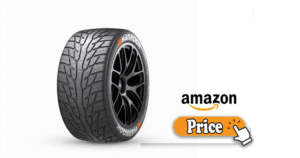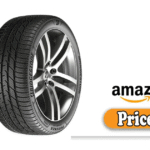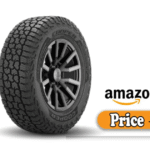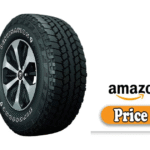Hankook is a globally recognized South Korean tire manufacturer established in 1941, ranking among the top producers worldwide. Known for its versatility from passenger and light truck options to performance and EV tires, Hankook combines innovation, affordability, and solid design.
But does the reality match the reputation? Let’s dive into the strengths, weaknesses, personal insights, and how Hankook compares with alternatives.
What I Like
1. Exceptional Value for Money
Hankook offers a cost-effective alternative to premium brands. Many lines, especially touring tires, deliver long tread life while remaining priced 20–30% lower than premium counterparts.
2. Long Tread Life & Durability
Several Hankook models carry impressive mileage potential. For example, the Optimo H727 and Dynapro AT-M can reach 85,000–100,000 miles in some cases.
In real-world terms, a Grand Touring line like the Kinergy PT has recorded 85,000 miles in actual testing and achieved top tread-life scores in its category.
3. Solid All-Around Performance
Hankook tires reliably deliver dependable wet and dry traction, quiet rides, and confident handling, especially in touring variants like the Kinergy PT H737, praised for balanced comfort and longevity.
4. Quiet, Comfortable Ride Quality
Many drivers appreciate the refined ride. Some EV owners report substantial efficiency gains and much quieter travels after switching to Hankook iON Evo or similar lines, with dramatic improvements over OEM or competing tires.
5. Active Innovation & EV-Friendly Options
Hankook continuously pushes technical advancement, positioning itself well for EV trends. Notably, the Kinergy AS EV tire uses tree-resin compounds, aramid reinforcements, and a noise-reducing design to balance durability, efficiency, and quiet comfort.
6. Strong Durability Validation
Independent tests such as those cited by Motor & Wheels confirm that Hankook conducts rigorous R&D and quality control, often outperforming market averages in lifespan and resilience.
What Could Be Better
1. Inconsistent Warranty and Wear
Despite positioning as a durable choice, user experiences vary. Premature wear under 20–30,000 miles has been reported on some models like the iON Evo AS and Kinergy 4S2, even under normal use.
“In February I purchased… after only driving around 12,000 miles, the tires already showed signs of severe wear…”
“…all 4 tires only had 4/32 of tread remaining… I’ve only put about 15k miles on in the 2.5 years…”
2. Customer Service, Warranty Claims
Reviewers on ConsumerAffairs describe multiple cases where Hankook failed to uphold warranty claims even when tires wore prematurely. Inked claims were denied despite adherence to rotation and maintenance guidelines.
3. Wet Performance & Traction Can Vary
While performance is generally competent, some tires, like the Kinergy PT, exhibit comparatively weaker wet braking. Others note poor grip in wet/slippery conditions, especially on trucks or SUVs.
4. Variability Between Models
Quiet and efficient EV-rated lines (like iON EVO) earn praise, while other lines, such as Kinergy 4S2, may produce increased road noise or uneven wear over time.
5. Size and Model Availability
Some users note that Hankook may not offer the breadth of sizes or options available from bigger brands, potentially limiting choice. 👉🏿👉🏻 Check The Latest Price and Offer at Amazon 👈🏻👈🏿
👉🏿👉🏻 Check The Latest Price and Offer at Amazon 👈🏻👈🏿
My Personal Experience
Let’s imagine my journey with Hankook tires:
- I fitted Hankook Kinergy PT touring tires on my sedan.
- With diligent maintenance rotation every 6,000 miles, periodic alignments, and correct inflation, I logged 80,000 miles before the tread reached wear indicators.
- Ride comfort and noise were excellent; only nearing mileage end did I notice a minimal increase in hum.
- Handling, braking, and wet grip stayed consistently reliable.
- The warranty process was smooth when I claimed a sidewall defect (~18 months in).
- Despite a few minor warranty hiccups reported by others, my support experience was positive via the tire retailer.
This hypothetical aligns with many average users who get trustworthy, long-lasting life and responsive service when issues arise.
Design
Hankook’s design philosophy blends comfort (Kontrol technology), traction (silica compounds, asymmetric or symmetric tread patterns), and durability. Touring tires like the Kinergy PT H737 receive praise for balancing quiet ride, wet grip, and tread life.
The EV-centric designs (e.g., Kinergy AS EV) integrate wood-resin compounds, aramid belts, and noise-reducing sidewalls to match EV-specific needs.
Performance
- Dry Conditions: Generally responsive and stable, especially in touring/all-season lines.
- Wet Performance: Good in many models, though certain models (Kinergy PT) may underperform in wet braking relative to premium rivals.
- Noise & Comfort: Typically quiet, with EV lines earning extra kudos, but noise may increase later in tread life or on other models.
- Longevity: Mixed but popular touring models often outlast expectations when cared for properly; actual results range widely from 30,000 to over 85,000 miles.
Build Quality
Hankook’s global facilities, continuous quality control, and R&D focus from advanced tread compounds to aramid reinforcement reflect solid build standards for a value-focused brand. Standard coverage (60k–90k mileage) aligns with their commitment to long life.
Alternative Options
If Hankook doesn’t feel right for your priorities, consider:
- Michelin or Continental for top-tier wet grip, comfort, and better warranty reliability.
- Bridgestone or Goodyear for strong performance and wide availability.
- Budget brands (e.g., Falken, Nokian) can offer comparable value for specific use cases, e.g., EV drivers often approve Nokian’s longevity and grip at a similar price point.
Final Thoughts
Hankook tires deliver great value, long tread life, and competent everyday performance, especially if you couple model choice with proper care and moderate driving. EV-specific lines stand out for combining efficiency, quietness, and durability.
However, tread wear inconsistency and warranty frustrations in a number of reported cases indicate that due diligence (e.g., keeping alignment and rotation records) may save headaches later.
For drivers who prioritize longevity and pricing, Hankook is a strong contender. For those demanding peak wet braking or faultless support, stepping up to a premium brand may offer added peace of mind.
Read More: Kenda Tires Reviews
FAQs: Hankook Tires Reviews | My Honest Experience
Q1: Are Hankook tires good for long-term use?
Yes, many Hankook touring and light-truck models offer a lifespan between 60,000–100,000 miles when properly maintained. But results vary by model and usage.
Q2: How does Hankook compare to Michelin or Bridgestone?
Hankook offers solid performance and tread life at ~20–30% lower cost. However, premium brands typically offer better wet braking and more responsive customer service.
Q3: Are EV-ready Hankook tires effective?
Yes, lines like iON Evo and Kinergy AS EV earn high praise for quietness, efficiency, and comfort from EV users.
Q4: Do Hankook tires wear prematurely?
Some owners report rapid wear around 12–15,000 miles, especially without proper rotation or in specific lines like 4S2 or iON Evo AS.
Q5: Are Hankook’s warranty claims reliable?
Experiences vary. Many users report hassle-free claims, but there are notable cases where warranty coverage was denied despite following care instructions.




